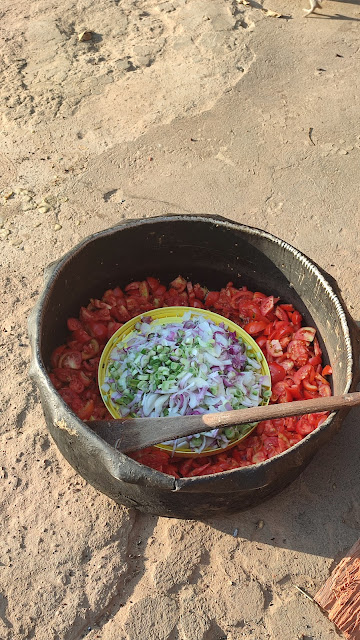Elevation
What a week. We feel lifted. Tomorrow morning we leave for Lilongwe by 10am, to get there for a lunch gathering. We’re seeing a few of the university students (including Faith Winga - interview with her from earlier this year here) and a former pupil who studied Tailoring and Design. She now supports herself by sewing garments, and doesn’t know it yet - we’re getting her her own sewing machine tomorrow so she’ll no longer have to wait for her friend’s to be free. (It’s a tiny step in the direction of sending out Vocational Training Centre graduates with tools of the trade.) Still others will be there whom we know from their days at Home of Hope, and have moved on.
Perhaps being able to look forward to the lunch will make it a little easier to leave. In truth I doubt it.
Aferwards, Lucy suggested we take some pictures all together. Drone time!

Some of the children were keen to see the videos (the above are quick screenshots while playing them back on my iPad), so we sought the shade of a tree and huddled.
Phil and Ruth headed in to town for an hour. Ruth started her own craft business “Emerald Stitcher” not long ago, specifically to generate funds to support Home of Hope girls through further education. Appropriately enough, she uses fabrics from Malawi.
(Thanks for the photo, Phil!)
Ruth managed to tear herself away and get back in good time for our long-awaited interview with Primary School staff. Head Teacher Barton Butao (centre, below) and his Deputy, Bartholomew Mbewe, joined us at the Visitors’ Lodge.
Just a couple of years ago, as Covid was taking hold around the world, Home of Hope’s Primary School student attainment was the highest among the 15 government Primary Schools in the local area: of 44 Standard 8 learners (nominally 13-year olds, though in Malawi as in some other countries students are “held back” if they don’t pass end-of year assessments), almost all gained places at government Secondary Schools. Barton puts their success down to a combination of trust in their deeply dedicated staff, high standards for conduct, and motivation through positive reinforcement.
Though for different reasons, the Primary School shares the Secondary School’s problem with scarcity of text books. During the pandemic, learners were allowed to take books home to study. Only a few books came back - at all, or in usable condition - so that now students must share one between six or so. Beyond addressing this basic need, they have a vision for a more conducive learning environment for pupils. Renovated flooring and redecorated walls; better lighting through more modern windows (Phil visited another school between here and Mchinji this week to see examples of good window and door designs - high light transmission, termite-proof and ball-proof!); blackboards that don’t consume three or four sticks of chalk per lesson because they’re so rough!
Barton and Bartholomew are every bit as ambitious for their pupils as the Secondary School Head Teacher, Edgar Kambwiri. They know their opportunity goes as far as shaping the future of their nation.
A few days ago, the construction work underway to provide more on-site housing for staff at the Vocational Training Centre looked like this:
This is an urgent project: the Memorandum of Understanding of 2020 between the Malawian Government and HOH for government teachers at the Vocational Training Centre is conditional upon them being provided with housing. Home of Hope can’t afford to risk that offer being withdrawn.
This afternoon we met with members of the staff team to agree how best to allocate scare equipment. We all understand the importance of accountability to donors and sponsors, so if something was given for X, using it for X is important. 16 smart phones given by a UK company come with the expectation that eight will help Home of Hope students now at university who lack a phone - the remainder going to staff who need one.
(Lucy Chipeta with mobiles for university students)
Tonight was party night! Shortly before leaving for Malawi, I had a cup of tea with a neighbour in Bedford who’s been unwell for some time. (We’d not met since March/April, when we both found ourselves in hospital.) Malawi came up in the conversation. “Wait here,” they said, then after a minute or two pressed an envelope in to my hand. I opened it once I’d reached home as instructed, and immediately phoned to ask, “Are you sure?!” We discussed possibilities for the money, and agreed that a special meal for all the children and staff at the end of our trip would be wonderful. So, at four this afternoon I went to see how the cooking was going.
Everyone on site came to eat, chat and dance: children, teenagers, the security guards, builders, staff.
As the party wrapped up and children went off to their houses and dorms, a young staff member, Mphatso, said, “I wish it could be like this every day.” There’s a lot about life here I’d say that about. Not every day can be a high point, but time here provides some kind of elevated perspective on things.

























Comments
Post a Comment